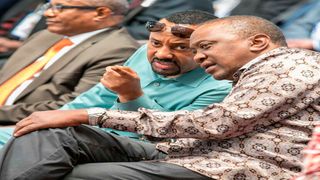
in this file from from 2019, President Uhuru Kenyatta and Ethiopian Prime Minister Abiy Ahmed Ali converse during the official opening of the Debre Birhan Industrial Park in the Amhara Region of Ethiopia.
|News
Premium
Ethiopia war: Kenya issues advisory
Kenya says it will restrict any movements of military or diplomatic redeployments through its territory in the wake of temporary relocation of foreign staff from Ethiopia over security reasons.
In an advisory note to foreign missions and offices of international organisations stationed in Nairobi, the Ministry of Foreign Affairs said it will allow any movements of personnel or equipment from a “third country” through Kenya, but only if they meet criteria, including prior approvals.
The notice, known as ‘note verbale’ in diplomatic terms, does not mention Ethiopia by name, but says recent events in the region may force some foreign countries to relocate their military and diplomatic staff and equipment to Kenya and must follow protocol to do so.
A number of countries— including the US, UK and Ireland— have warned their nationals to leave Ethiopia as soon as possible.
There were other reports of military repositioning in the region by foreign countries just in case a more urgent evacuation was needed.
The US said it would be evacuating their diplomatic staff from Ethiopia although it did not indicate whether those staff will temporarily work from neighbouring countries.
“Military and security personnel and in particular those carrying security equipment and communication equipment and weapons of any kind must have clearance and inform of their redeployment and relocation prior to their arrival and must receive consent in advance. They are also required to possess valid travel documentation,” says the note issued on Thursday last week to all embassies in Nairobi.
“Diplomatic missions should notify the Ministry of Foreign Affairs of the arrival of their diplomatic staff who have been relocated from the region to enable the ministry to regularise the deployment in the country.”
Though the advisory was generic, it is Ethiopia which has had a deadly conflict since last year when the Tigray People’s Liberation Front (TPLF), a rebel group that was once a ruling party, reportedly attacked a northern command of the Ethiopian National Defence Forces in November last year.
And Prime Minister Abiy Ahmed ordered what he called a law enforcement operation on the group.
Since then, the TPLF who had earlier claimed a series of victories, have been pegged back as Mr Ahmed’s frontline appearance is boosted by support from the Middle Eastern allies.
From last week, the PM, a Nobel Peace Laureate, announced the TPLF were no longer capable of attacking Addis Ababa as they had threatened before, and cautioned sensationalism from foreign media for what he said was unnecessary scaremongering about the security situation in the country’s capital.
On Saturday, Addis Ababa announced the national forces had captured more territory in Amhara region that had fallen to TPLF several months earlier.
Abiy’s office said his forces had captured Zobel mountains, Arjo, Fokisa and Boren towns considered strategic as they lie on a major highway.
He also said towns of Dire Roqana and Sodoma as well as Ambasel had been freed from the TPLF who had fled the scene.
Ethiopia is home to the headquarters of the African Union, the continental bloc of 55 member countries.
It also hosts the offices of the UN Economic Commission for Africa, as well as more than 120 other diplomatic missions.
The African Union earlier rejected rumours it planned to temporarily relocate due to the war.
Instead, the continental body has been asking for ceasefire and national dialogue between warring parties, a position Nairobi endorses.
Nairobi said all requests for redeployment must be done through the requisite diplomatic channels and that all affected staff and their identity and equipment must be provided before actual arrival, including that those staff must have valid travel documents before touching down in Kenya.





